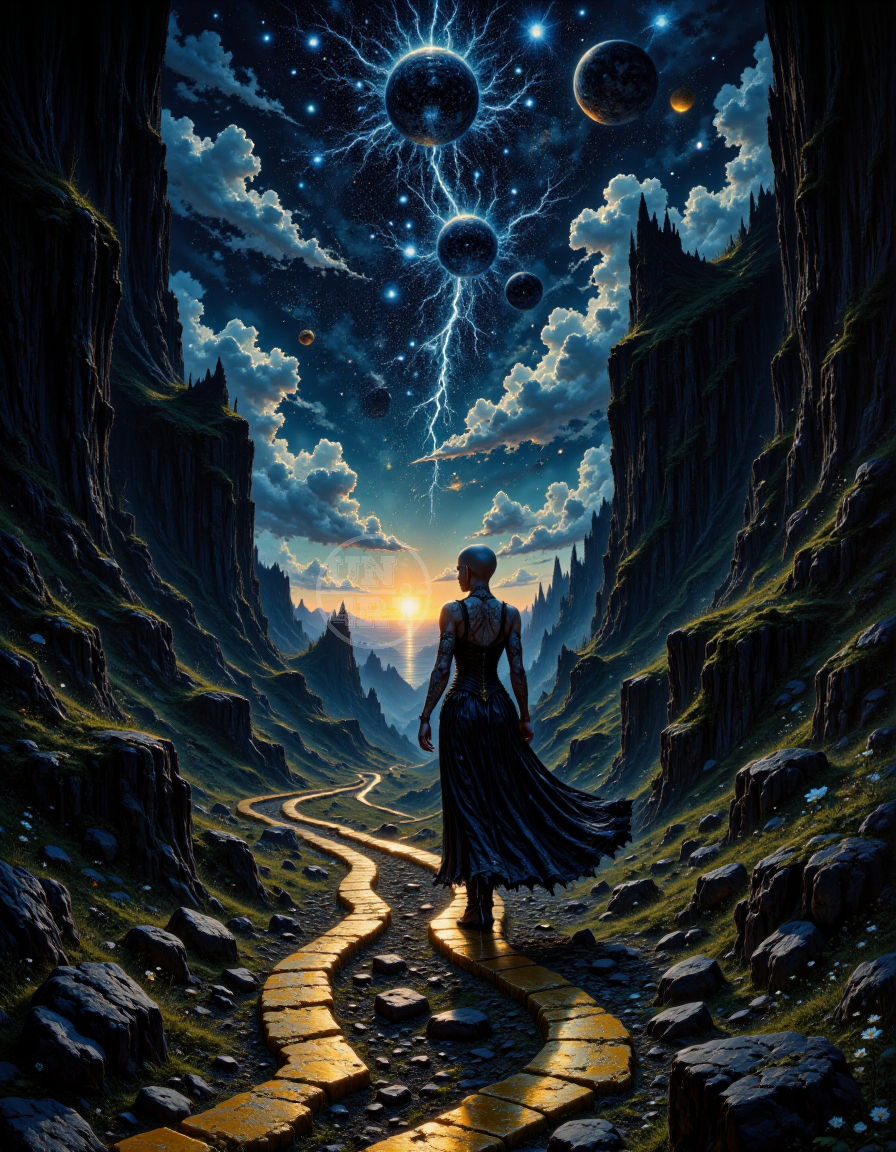Resistance: The voice that comes from outside, but lives inside
- UN4RTificial

- May 31, 2025
- 17 min read
Updated: Aug 19, 2025
Have you ever noticed that every time we are about to do something important, something that will help us grow, evolve and develop ourselves, something happens to stop us? It is as if there is a safety lock that paralyses our achievement. This ‘lock’ can take the form of a thought that tells us not to go ahead, or comments/judgements from people close to us, or even feelings that freeze us.
It's as if everything around us becomes more important than doing what we want to do...
There is not a single human being who has not encountered this ‘force’ that disguises itself as conscience, common sense and maturity. But what we don't know is that it is the echo of the world, disguised as intimate thoughts, and that it is not laziness or indisposition. It is more like a Machiavellian internal mechanism, almost disguised as prudence and perfectionism.
We are talking about Resistance, of course, something that seems to have been born from the incestuous union between fear, social conditioning and a nervous system that is tired of taking a beating. Most of the time, we think we are listening to our conscience, when in fact we are listening to the collective voice of everything we have been told not to be.
The Bow Tie Saboteur
Contrary to what many people think, resistance does not come shouting or kicking down doors. No, quite the opposite. It is sneaky, takes off its shoes, tiptoes in and settles down on the sofa of our mind with a sarcastic smile, ready to begin its speech.
The wretch is more articulate than a politician in an election year and more convincing than a pyramid scheme salesman. Resistance is, in its excellence, the most powerful mental algorithm that has learned to keep us in ‘safety and energy-saving mode’.
It is more like a command, programmed like an antivirus in our psyche, which detects any attempt at transcendence and rejects it as if it were a threat. Try writing a book, launching a project, getting out of a failed relationship, starting a diet... voilà, resistance appears.
It is the cunning enemy of artists, creators, entrepreneurs and passionate people, but above all of anyone who dares to want to escape mediocrity. And make no mistake, when we hear the voice of resistance, we are not ‘just being realistic’. No. We are being tamed.
At the Self-Sabotage Buffet, Resistance is the starter dish

Resistance is an ancient and collective force. It reverberates in our minds. An echo of the voices of society that told you you were mediocre, that you were good for nothing, that you were ordinary and unnecessary, stupid and foolish, of those bosses who demanded more and more productivity, but killed your creativity...
Over time, all these voices became so constant that they ended up becoming part of your mental furniture. They became resistance, the kind that loves a sophisticated answer, wears a suit and bow tie, and speaks in a difficult way, sometimes even quoting philosophers.
It's that part of us that loves to procrastinate on projects with the classic excuse: ‘I'm maturing the idea,’ even when the idea itself is already rotten from being so mature...
Don't believe me? Here are a few examples:
‘I'm waiting for the right moment.’ (that moment doesn't even exist)
‘I bought another course, it was cheap. This one will help me.’ (anything to postpone the action just a little longer)
‘Oh, but so-and-so already does that better than me...’ (so what?)
‘I don't want to seem selfish or arrogant...’ (so being mediocre is better?)
Internal sabotage is a low-intensity vicious cycle. It doesn't kill you quickly, but it sucks the life out of you in homeopathic doses.
The Diagnosis of an Invisible Illness
If you haven't read Steve Pressfield's ‘The War of Art,’ you should. Do it before you decide to buy another online course that promises to unlock your productivity and discipline.
Steve talks about Resistance as the most insidious force in the creative universe. It's an almost metaphysical thing that acts against any impulse toward evolution, innovation, or authentic expression.
If at any point in your life you have tried to start a business, lose weight or simply change a harmful habit (such as smoking, for example), and somehow you have mysteriously failed... congratulations. You have come face to face with Resistance.
The most perverse thing about this force is that it disguises itself as rationality, using our own arguments against us. Pressfield states: ‘...the more important the project is to our soul, the stronger the resistance will be...’, ‘...resistance is impersonal, relentless, inexhaustible...’. It acts like gravity, it doesn't care about our biography, it will simply turn our stumble into a fall.
The interesting thing is that if we recognise its existence and make a daily commitment to our craft (writing, painting, creating, meditating, living with purpose...), we can also overcome it. Not in a heroic and definitive way, but in daily battles.
Pressfield also introduces us to the figure of the Professional, who, unlike the amateur, shows up every day to do the job. The Professional may be afraid, uninspired, have a stomach ache... it doesn't matter. He faces Resistance with discipline and not with cheap motivation.
Fear as Symbolic Capital
But if you're sitting there thinking that Resistance is just an individual issue, both Pressfield and other thinkers would politely disagree with you or even give you a metaphorical slap in the face...
We live in a society that profits from our paralysis. An entire industry is built on our low self-esteem and lack of self-worth. The lucrative machine of spiritual well-being, motivational coaching, and even certain niches of pop psychology exploits precisely the gap left by resistance: that existential hole of ‘I could, but I can't.’

The result? Everyone is spending money on pills that promise to relieve anxiety and give courage, courses on how to find purpose, and meanwhile... society continues to applaud the unfinished effort. Failure, as always, is socially acceptable.
Everyone was already talking about this plague
Although Mr Pressfield christened it Resistance, it is no surprise that various philosophers, thinkers and creators of both sexes who dared to live outside the norm have also fallen victim to this ‘force’.
Arthur Schopenhauer, that sad-faced uncle, for example, believed that life was dominated by a blind and irrational will that pushes us towards pain and boredom. In other words, resistance is a natural consequence of our existence. It is a force that, if not properly mastered, will drag us into resignation.
On the other hand, Angela Davis spoke of resistance as a political act. She said that the act of resisting is about survival and reinvention, not only personal, but collective. When we decide to face internal resistance, we are saying ‘no’ to the structures that want us to be inert, conformist and silent.
The philosopher Søren Kierkegaard once said that the greatest despair is not to be oneself. Resistance acts on this open wound, preventing us from being ourselves, but allowing us to be like everyone else. It does so not because it wants to harm us, but because it is, in fact, the force of inertia disguised as self-preservation — and like all forces of inertia, it will only lose when the force of action overcomes it.
The father of psychoanalysis, Sigmund Freud, would call resistance an ‘ego defence mechanism.’ When we are about to face our deepest desires or most intense traumas, our mind always finds a way to sabotage the process.
Jung said that what we fear most is where the greatest treasure of our psyche lies. In other words, what we ignore, resist and don't want is actually exactly where we should be focusing our attention.
Nietzsche spoke extensively about overcoming the ‘common man,’ about killing the ‘herd spirit’ to become the Übermensch (beyond man/superman). This is not in the fascist sense that some ignorant people interpret, but in order to be beings who create their own values. However, for this to happen, it is necessary to silence the echo of imposed morality.
Simone de Beauvoir, in ‘The Second Sex’, spoke of resistance, exposing how women are educated from an early age to be the ‘other’, the supporting actor, the shadow. We are educated to give up, to retreat, to doubt ourselves. She spoke of how much the other defines, limits and shapes us. This resistance is sometimes just a reflection of the gaze of others, tattooed with fire on our foreheads.
When we analyse these different views, we perceive a certain air of duality. While some see resistance as imprisonment, others transform it into a tool for liberation. Let's say that it is precisely in the midst of this tension between opposites that we, as modern individuals, find ourselves — between letting ourselves be carried away or becoming masters of our own path.
The point is that resistance, like the gods of the Hindu pantheon, has many faces... and to face it, we must recognise them all. To do this, perhaps we should think a little more like Albert Camus, who, when looking at the absurdity of life, did not fall into nihilism, but found his own freedom. Resistance may tell us that it is useless to try, but Camus's answer is: always try and do it anyway.
When the Resistance ‘Wears’ a Familiar Face
You've probably seen the classic film The Matrix. In the film, the antagonist Agent Smith — that man in a dark suit, dark glasses, monotone voice (‘... Why, Mr. Anderson? Why? Why do you persist?...’) and omnipresent presence — is brilliantly played by actor Hugo Weaving. The guy is not just a villain, but the embodiment of the system, resistance in its purest and most aggressive form.

What is frightening is not Smith himself, but the fact that anyone can become an agent. It is very easy to remember the scene in which an ordinary, seemingly harmless civilian witnesses a potential threat to the stability of the Matrix and, in seconds, his body is taken over by the programme. And so, as if by magic, another Smith appears to maintain order.
This is exactly how the resistance operates in the real world. It infiltrates well-meaning friends, overprotective family members, marriages... all to ‘spare us frustration.’ This gives rise to phrases such as: ‘Are you sure...?’, ‘Wouldn't it be better to wait a little longer?’, ‘If I were you, I would...’.
Phrases coated with affection and attention, but steeped in the logic of restraint. People who use these phrases unconsciously become agents of resistance. Of course, they are not bad people, they have just been plugged into a system that considers anyone who dares to dream outside acceptable standards to be dangerous.
Identification of Possible Agents
Yes, they are everywhere. Often, we are them — especially on days when we are tired, feeling down, or just going through the motions. The biggest problem is not that these agents/people exist in our lives. The problem is when we listen to them.
Below are some tricks that can help you identify an ‘Agent Smith’ who has infiltrated your daily life.
They have a habit of projecting their frustrations onto others - Everything they didn't have the courage to do, they will try to prevent us from doing.
They always appeal to conservative logic - Stability, security, and not standing out too much. These are the arguments they use. Don't draw attention to yourself, just be one of the crowd. That's how they roll.
Many use the word love as a weapon - ‘I only say that because I care...’ Yeah, right, most people fall for it, because they forget that misinterpreted love imprisons the other person.
When we are about to break an internal boundary, they appear - Coincidence? Definitely not. Resistance always knows when to act.
They like to mock discreetly and subtly - unfunny jokes, irony and sarcasm... the target? Your dream. All very well disguised as ‘jokes’.
These people don't wear suits, but they are everywhere, even in your mirror. Yes, sometimes Agent Smith lives inside us - and we don't even realise it.
Which Pill Should You Choose?
Neo begins his saga feeling insecure, fragile and doubting everything, including himself. Just like us, when we decide to act against the resistance. Choosing the red pill, deep down, is not about seeing the truth all at once. It is about deciding to see the truth every day, even when it is painful.
Resistance hates questions, movement, improvisation. The system loves and encourages predictability, which is why any creative, bold or counterintuitive action is always seen as a threat.
Every time someone reacts with disdain or fear to what I want, I see Agent Smith's face. I see his sunglasses, his furrowed brow, and his robotic tone of voice. And then I ask myself: Is this the person who will define my life?
This action may seem extreme to some, but remember: the voice of resistance may come from your aunt or with your company's HR signature. Therefore, if we are living according to our truth, we will be out of the Matrix, even if we are still learning to fly.
When the Trigger Becomes a Grenade
We already know that resistance is a master of manipulation, that it doesn't come in through the front door and announce its presence. So it's good to know that it can also creep in through the cracks left by unresolved issues from the past.
It rummages through our traumas like an emotional hacker and, once it finds a trigger, turns any innocent phrase into a war zone.
You know that silly comment someone made that shouldn't have affected us so much, but it makes us explode? Yeah, that's right.
It feeds on what we haven't healed, what we sweep under the Persian rug of our minds. It doesn't matter if it was rejection in childhood or abuse disguised as a joke, a comparison made between siblings, or even the silence after the first heartbreak can serve as ammunition.
Resistance will recycle our traumas and blockages, putting them in the mouths of others. And those others are often the closest, dearest, and most intimate people in our lives.
So don't be fooled. It won't be the internet haters who will prevent you from growing the most. It will be those we love. Not out of malice! But because these people are often afraid, afraid of losing us, afraid that we will change and leave them behind... Thus, our triggers end up becoming real emotional grenades.
A simple phrase like ‘You've been different lately...’ can turn into a ridiculous argument. All this for what? Because it touches that spot where we still bleed. That trauma of not feeling accepted, of being rejected and judged... and that's what resistance loves most.
This cycle of sabotage happens silently, and what's more, it's socially accepted. We start to mould ourselves so as not to ‘bother’ others, to avoid ‘conflict’, to not ‘upset’ anyone and to keep things ‘peaceful’. But guess what? That peace becomes the grave where our evolution and growth rest in eternal peace.
What weakens the Resistance
As long as we allow our past to dictate our present, resistance will survive. And this isn't cheap motivational talk, it's just biology. Our brain reacts to triggers with the same level of threat as an armed robbery. It paralyses us and makes us react like a frightened child rather than a conscious adult.
Because of this, healing is no longer a luxury, it's a war strategy. Every trauma we recognise, name and process becomes a piece of ammunition we take from the hands of resistance. Every difficult conversation we face with vulnerability becomes armour we build for ourselves.
We shouldn't wait for others to change so we can free ourselves. The initiative for change begins with us. We change so that others reveal their true intentions. Will some of our relationships end? Yes, but only those that worked based on our limited version of reality.
Because if there's one thing the resistance hates, it's when we heal. When we heal, we start to act differently. We start to respond with clarity where there was once anger. We start to say ‘no’ where there was once only silence. We start to believe more and say ‘yes’ to ourselves, and that, my friends, is the greatest affront we can make to the system.
The smaller the target, the harder it is to hit
Imagine your ego as a target, with a red circle in the centre. The bigger the target, the easier it is for anyone – whether a friend, relative or stranger – to hit it squarely with criticism, subtle contempt, judgements and biased looks.

Now imagine that target shrinks significantly. Let's say it shrinks until it fits in our pocket. It becomes much harder to hit, doesn't it? That's right. That's my idea of a healthy ego. Small, centred and firm. It is invisible when it needs to be and present when necessary.
Resistance will always want to inflate our ego. The bigger, the better, because a big, pompous ego is always much easier to hurt — and the more hurt it is, the more vulnerable the person will be to self-sabotage.
The Universal Victim Syndrome
When we take everything too seriously, everything becomes an attack. A differing opinion becomes an offence. Constructive criticism becomes disrespect. Furthermore, any form of disagreement will be seen as a direct threat to our identity.
The disproportionate ego, the one that needs approval, recognition and external validation, is the target that resistance likes best. It whispers in the ear of the inflamed ego: ‘You are too special to fail...’ When deep down, it would like to say: ‘You must not risk anything at all, because you cannot bear to fail.’ The old trick of false pride, which disguises itself as self-esteem.
But, as paradoxical as it may seem, when we manage to diminish our ego, that is when we grow inside. The less space our ego takes up, the more room we have to try without fear of looking ridiculous.
Nietzsche loved paradoxes and said that ‘... you must have chaos within you to give birth to a dancing star...’ This becomes possible when we deflate our ego to the point where we can move with greater freedom. An inflated ego is like an invisible prison; we are always more concerned with what we appear to be than with what we really are.
Resistance works hard to make us take offence, to make us retaliate, to make us fight... all in the name of defending something that does not need defending. It always wants to keep our ego as an easy target, prominent, exposed, needy and emotionally dependent on the opinions of others.
Some ways to face Resistance, educate the Ego, and grow as a human being
Call a spade a spade – identify the voice of resistance, personalise it if you want, use a phrase like ‘Get out on the field, princess’ (Spring ins Feld, Prinzessin!).
Be ridiculous sometimes – do it on purpose, tell bad jokes, wear tacky clothes, dance and sing in public. This destabilises vanity.
Set micro-goals - they can be absurdly small, it doesn't matter. The idea is to get you to the next step.
Apologise first - regardless of whether you are right or wrong, apologise. This helps to educate pride.
Write to the resistance - write a letter, talk to it as if it were a toxic ex-boyfriend.
Listen to criticism without arguing - write it down, analyse it and maybe learn something from it.
Question your excuses as if you were Sherlock Holmes - investigate the excuses you love to give yourself and others, then ask yourself why you use them.
Talk less about yourself — in conversations, take a genuine interest in others, otherwise don't talk to anyone. The ego always kicks up a fuss with this one, ignore it.
Visit your ‘cave of fear’ once a week — yes, analyse and question your fears. Know exactly why you still carry them.
Quote your favourite thinkers - Use quotes like a weapon. ‘Nietzsche said: become who you are, then shut up, resistance.’
Leave Plato's cave immediately - if you feel pain when you consciously face the light of day, then congratulations, you have left the cave.
Embrace doubt as a philosophy — the ego loves certainty, and so does resistance. We evolve through questions, so use that to your advantage, not against you.
Come back tomorrow — didn't work out today? No problem, tomorrow you have another chance. Resistance hates persistence.
The Resistance does not want us dead, it wants us neutralised
To be clear. Resistance does not want us to give up, it just wants us to become harmless, mediocre, silent, predictable... In short, it wants us to continue existing without truly living. It wants to see us posting motivational stories while avoiding real confrontation. It wants to watch us read about spirituality without ever meditating or applying what we have just read. It wants us to say, forever, ‘one day I will...’ until our last breath.
The resistance will always adapt, evolve, and sometimes even appear to be an ally, but what it really wants is for us to remain in comfortable existential limbo, that place between action and potential. The idea is that we continue to be emotional zombies who look like successful people.
And the only way out of this mess is conscious confrontation. That's when we develop the emotional courage to take a stand in front of life and others. Not as martyrs, but as individuals who have finally understood that living is a creative act.
Resistance is the voice of a system that is also inside you, trying to keep you exactly where you are. Don't listen to it anymore. Do something. Get started. If you make a mistake, that's okay, laugh. If it hurts, take care of yourself. But don't stop, not anymore!
Well, if you enjoyed this article, keep exploring the others here on the blog. Interact, leave your comments, criticism, suggestions, questions, stories... do something! And, of course, recommend this blog to anyone who needs to hear irony with affection.
Oh, if you're the type who likes more underground, raw and unfiltered content, visit the UN4RT website - our free backstage, but reserved only for the most demanding, restless and free minds.
PS: Some final information worth mentioning.
Resistance is not always negative; it can signal important areas of life where there is fear, unresolved trauma, unconscious blocks... Facing it always leads to personal growth.
To find out if you are acting for yourself or under the influence of resistance, ask yourself: ‘Am I avoiding this out of fear or by conscious choice?’ The answer will be very clear if you are honest with yourself.
People close to you can often reinforce resistance out of unconscious protection, fear of loss, or simply because they are also dominated by their own resistance.
Therapy, when facilitated by a good professional, helps to identify patterns, restore emotional autonomy and dismantle the invisible mechanisms of self-sabotage. All of this effectively helps to combat resistance.
It is not possible to live without resistance. It is omnipresent and will always exist. The difference is that when we act consciously, we make it smaller and weaker. But for this, we need to be in motion, in creation and, above all, in the present moment.
‘The illusion crumbles when we question reality’ – UN4RT
Grab those sources, references, and inspirations. Good luck!
Steve Pressfield, The War of Art.
Arthur Schopenhauer, The World as Will and Representation.
Angela Davis, Freedom is a Constant Struggle.
Søren Kierkegaard, The Sickness unto Death.
Sigmund Freud, Inhibitions, Symptoms and Anxiety, The History of Psychoanalytic Movement and Introductory Lectures on Psychoanalysis.
Carl Gustav Jung, Aion: Researches Into the Phenomenology of the Self.
Friedrich Nietzsche, Thus Spoke Zarathustra and Ecce Homo.
Simone de Beauvoir, The Second Sex.
Albert Camus, The Myth of Sisyphus.
The Matrix, A science fiction film released in 1999, written and directed by sisters Lana and Lilly Wachowski. It is considered a landmark film for its philosophical depth, innovative visual style, and for popularising the concept of ‘simulated reality’.
Agent Smith, is an artificial intelligence programme created by the machines within the Matrix. Its original function is to maintain order and eliminate threats to the system, such as Neo and the awakened humans. It is a kind of ‘system antibody’ that acts against anything that tries to disrupt the status quo.
“… Why, Mr. Anderson?. Why?, Why do you persist?...”, This phrase occurs at the climax of the third film in the Matrix franchise, The Matrix Revolutions (2003), during the final battle between Neo and Agent Smith in a rainy, apocalyptic version of the Matrix. Smith, already corrupted into an uncontrollable and cynical virus, questions this to Neo in a tone of contempt and incomprehension.
Hugo Weaving, He is a renowned Australian actor, born in Nigeria. He is known for his striking presence and voice and for playing iconic characters such as: Agent Smith in The Matrix trilogy (1999–2003), Elrond in The Lord of the Rings trilogy (2001–2003) and The Hobbit trilogy (2012), V (voice and body) in the film V for Vendetta (2005), and Red Skull in the film Captain America: The First Avenger (2011). The First Avenger (2011).
Neo, The protagonist of the film series The Matrix, played by Keanu Reeves. His real name in the real world is Thomas A. Anderson, a software programmer who lives a double life as a hacker with the code name Neo. He represents the ‘chosen one’ — a messianic figure destined to free humanity from the illusion of the Matrix, a simulated world created by machines to keep humans under control.
Spring ins Feld, Prinzessin!, It is a German saying that basically means ‘Go out into the world, princess!’, a call to leave the safety of your comfort zone and face the real world. This phrase is often used here at home by the other UN4RT.
Sherlock Holmes, A fictional character created by British writer Sir Arthur Conan Doyle in 1887. He is considered the most famous detective in literature and an icon of Western culture, known for his sharp intellect, relentless logic, and ability to solve complex crimes based on the art of deduction.




Comments